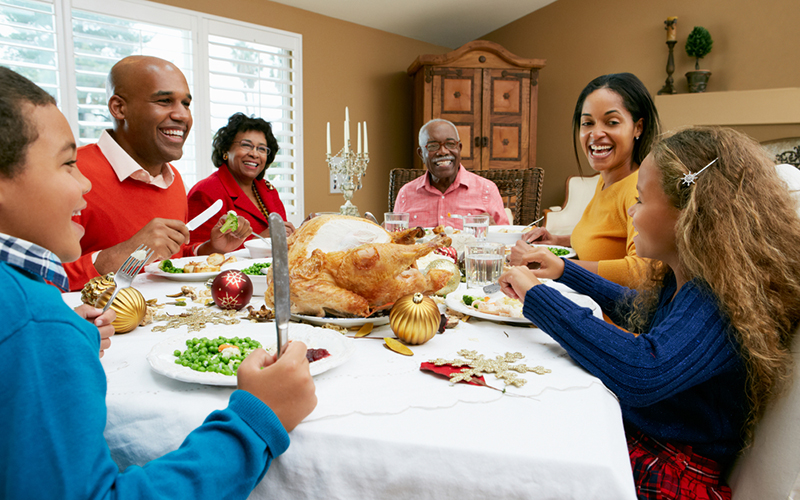
The holiday season is upon us! For many people, this season can offer some challenges to your healthy lifestyle. Schedules often become crowded and we are bombarded by holiday-themed foods nearly everywhere we turn.
Some good news first. A study published in the New England Journal of Medicine estimates that Americans gain about a pound over the holiday season. This is significantly less than the popular belief that weight gain at this time of year is 7-10 pounds. This exaggerated misconception may be related to the consumption of high salt, high sugar food items which often cause people to feel bloated but is not actually fat gain. So, not quite as bad as we might have thought!
The not-so-good news now. It appears that the pound gained, although small, isn’t lost over the year. Average weight gain for American adults is about 1-2 pounds per year, therefore holiday weight gains may play a significant role in our total annual weight increase.
Indulging in a small amount over the season is unlikely to threaten your overall health or body composition, especially if you are still taking brisk walks or enjoying other physical activities. It’s important to allow some indulgence to make your healthy lifestyle sustainable, however keeping these occurrences managed can help us avoid this progressive weight gain over time.
Let’s face it, during the fall and winter season we tend to gather with loved ones and celebrate with food. Expecting to avoid these occasions may not be realistic. Here are some of Valley’s nutrition experts’ favorite tips to support a delicious and joyful season.
Nora Delavari, MS, RDN, CD
- After finishing your first plate, wait 10-15 minutes, drink some water, and evaluate your hunger before going for the second plate.
- Refrain from drinking alcohol on empty stomach, and as always keep moderation in mind.
- Don’t sacrifice your sleep. Adequate sleep can help you feel rested throughout the day and make healthier food decisions.
Alexis Mettler, MS, RDN, CDE
Don’t try to start a diet now. You can absolutely enjoy the foods you love during this time and in fact this is not a good time to try going on a diet. People who try to diet during the holidays are generally unsuccessful and can end up putting on more weight than if they had simply tried to maintain their weight.
Indulge, moderately. When it comes to holiday parties, moderation is key. When you get to an event, instead of getting one of everything from the buffet choose a few things that you really love and savor them. This is a special time of year that includes special foods that you may not eat at other times. Whether it’s your grandmother’s decadent pecan pie or Aunt Sarah’s Parmesan mashed potatoes, have a little bit but truly enjoy them.
Stay hydrated. Being even mildly dehydrated can contribute to decreased cognitive function and irritability. Often we think we’re hungry when, really, we’re thirsty.
Mary Walton, MS, RDN, CDE
Say YES to vegetables! As winter fare tends to get heavier and higher calorie, it’s important to balance the plate with lighter fare, especially when temptations abound. Get creative with non-starchy veggies and bring them to events to brighten the palate. Start with a festive salad. Think sliced crisp apples with cinnamon and a dash of honey served atop bright greens and sprinkled with roasted pecans. Or fresh orange segments and a few dried cranberries atop a bright dish of greens served with walnuts and an orange juice-based dressing. Salads like these tempt the eyes, nose and mouth making for a perfect first course plate. Their touch of sweetness combined with fiber can calm the appetite so that guests find they eat fewer of the higher calorie dishes and have less of a belly ache afterwards. Some sources to get you started: naturallyella.com, eatingwell.com, Allrecipes.com, skinnytaste.com, pinterist.com.
Courtney McCliment, RDN, CDE
Use snacks to manage your appetite and avoid “saving” up for the big feast. Using healthy snacks around holiday events can enable better food decisions.
Be forgiving. If you’re feeling that you’ve over-indulged, use the experience to learn about your patterns and tendencies rather than for negative criticism which often leads to abandonment of all healthy efforts.
Michael Lynch, MS, RDN, RCEP, CDE, CHWC
Try one of my favorite recipes, Chocolate Avocado Pudding. It’s a low-sugar, soy, dairy, gluten-free (vegan) holiday treat – for those looking for something yummy while trying to balance food allergies and/or preferences. It’s healthy, and delicious. Try a blind taste test between this recipe and regular pudding, and I guarantee you won’t be able to tell the difference!
Ingredients:
1 ½ ripe avocado, peeled and flesh removed from pit
1/3 cup quality cocoa powder (100% pure cacao)
1/3 cup pure maple syrup or honey
¼ cup almond or coconut milk
2 tsp vanilla essence
Instructions:
Place all ingredients in blender or food processor and blend until smooth. Serve immediately.
Naeima Santana, MS, RDN, CDE
Chew Slowly: chewing your food fast may not only lead to overeating but it can also cause stomachaches afterwards. Holidays are about enjoying the company of our loved ones, so take advantage of this time to spend quality time around the dinner table and enjoy every single bite. Take your time and chew your food very well, you may even find out that you can taste the food better this way.
Start Moving: going on a family walk or playing a game with kids is a great way to get some physical activity after dinner while spending quality time with family members.
Reference: Yanovaski J, Yanovaski S, Sovik K, Nguyen T, O’Neil P, Sebring N. A Prospective Study of Holiday Weight Gain. N Engl J Medicine. 2000; 342;861-867.

